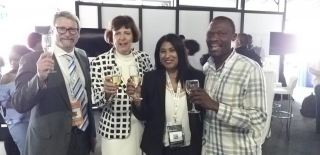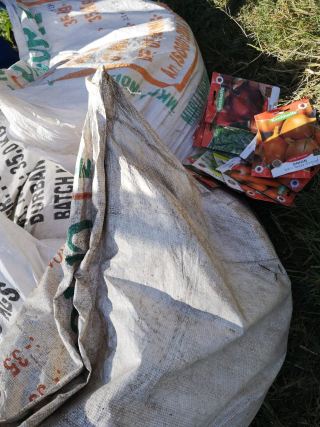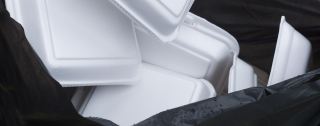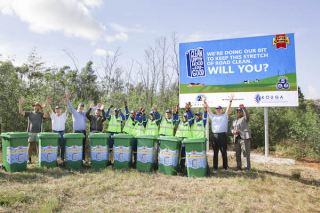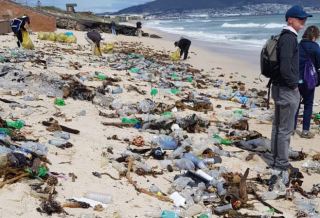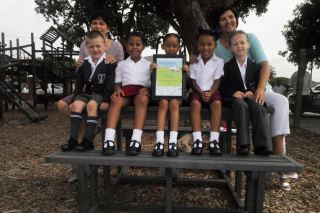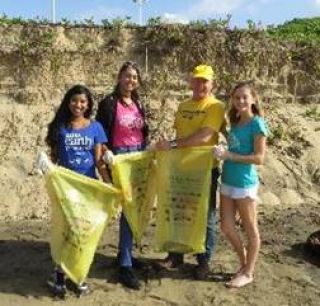Spring Month is Green Month - Preserve Our Trees!
In South Africa, September celebrates a number of significant events including Arbor Week, with the Department of Agriculture, Land Reform and Rural Development (DALRR) acting as the country’s champion of indigenous forests and trees.
September also sees the World Environmental Health Day and other international reminders of our need to manage our natural resources sustainably and combat accelerating climate change.
The DALRR has called for the public and organisations to get involved in greening their communities and partnering with local government and community-based organisations to coordinate the planting, care and management of all vegetation across urban and rural areas.
The department notes that trees provide more than just ornamental beauty in our open spaces. They provide benefits such as building materials, paper, fibre, oils, gums, syrups, pharmaceutical products, fruit and nuts while also preventing soil erosion. Trees also produce oxygen while using up environmentally detrimental carbon dioxide – they are the filters of our planet.
Incredibly, trees also provide rich nutrients for our soil through fallen leaves, they reduce flooding from rainfall run-off, they lessen sound pollution by deflecting sound waves, act as a windbreak and insulator during harsh weather, as well as providing habitats for wildlife.
In these ways, trees help to not only clean our air, but to reduce our energy costs, improve the productivity of our soils, preserve water supplies and contribute to a beautiful, liveable planet. According to Forestry South Africa, a forest producing 10m3 of wood per year will remove the carbon from the equivalent of 14 million m3 of air each year.
Hardwood trees grow extremely slowly and can reach tremendous sizes – capable of doing incredible work for our environment and impossible to replace in their function. Nathan Chapman, co-founder of sustainable building materials group Eva-Last, says this is why the industry needs to champion the use of alternative materials that protect our natural forests.
“Years ago, timber was in favour in construction and architecture for its look and feel, but it is clear that environmental sustainability and climate change imperatives outweigh any possible aesthetic benefits of using natural timber. At the same time, composite products for decking, cladding and other architectural finishes have come such a long way that they give away nothing in look and feel to real wood. There really is no reason to select timber any more,” says Chapman.
Eva-Last’s range of decking, cladding and beams includes some of the most advanced profile technology on the market. “It’s not just about the look and feel of the product. Over the last two decades we have introduced several patents that improve profile strength across framework spans while reducing profile weight and increasing product longevity significantly, even in the harshest environmental conditions. Our composite alternatives are also highly rated for fire resistance and non-slip surfaces, so in all ways these products are advancements on what timber can offer as a building material,” says Chapman.
He says warranties on Eva-Last products like the Apex range have expanded to cover three decades of use. “This is just unthinkable with real wood, which requires constant maintenance and upkeep, as well as being susceptible to warping, cracking, fading, staining, moisture ingress and destruction by environmental threats like termites. Now, decking, fencing, screening and railing can be put up and left up, requiring nothing more than the occasional clean, as a feature of a property that will not deteriorate or look scruffy in a few years.”
Eva-Last’s Apex, Infinity and Eva-Tech decking ranges are also secured with the company’s proprietary fasteners, under the Hulk brand, which ensure a consistent, flawless and invisible fastening finish. “This eliminates another key drawback of natural timber, which is that it is prone to cracking and coming loose from its fasteners over time, through weather cycles and under heavy use. With some of the most natural-looking, lightest and most durable products ever created available to customers these days, a truly sustainable approach to beautiful architecture and construction is possible – with none of the drawbacks,” says Chapman.
PLASTICS INDUSTRY UPBEAT AND HOPEFUL FOLLOWING SUCCESS OF PLASTICS COLLOQUIUM
Plastics SA, the umbrella body representing all sectors of the South African Plastics Industry (including polymer producers and importers, converters, machine suppliers, fabricators and recyclers) has congratulated the Department of Environmental Affairs, Forestry and Fisheries (DEAFF) on the hosting of a very successful Plastics Colloquium in Boksburg recently.
According to Anton Hanekom, Executive Director of Plastics SA, they applaud DEAFF Minister Barbara Creecy’s pro-active approach, openness and willingness to learn first-hand about the many successful projects that the various role-players in the plastics industry have initiated and been running over the past 10 years. “As an industry, we have been the first to acknowledge the need to reduce the impact plastics have on the environment and ensure that plastic litter does not end up in our oceans, water sources or anywhere in nature. To this end, Plastics SA and the four plastic Producer Responsibility Organisations (PROs), namely Petco, Polyco, SAVA and the Polystyrene Association of SA have launched various recovery and recycling projects, with which we have had great success. It was encouraging that Minister Creecy created an opportunity for the industry to showcase these achievements to her, her department and other environmental groups. Instead of blindly bowing to the pressure of anti-plastic campaigners, she expressed a willingness to engage with us,” Hanekom says.
An estimated 500 people representing the entire plastics value chain attended the Plastics Colloquium on the 21stand 22nd of November, which was presented in collaboration with the Consumer Goods Council South Africa (CGCSA) and Plastics SA. More than 50 exhibitions demonstrated the plastics industry and other stakeholders’ commitment to Extended Producer Responsibility, recycling and creating a circular economy. Attendees represented government, civil society, brand owners, recyclers, waste management companies, waste pickers, NGO’s and SMMEs who were all encouraged to attend the presentations, panel discussions and visit the exhibitions.
Speaking at the opening of the Colloquium, Minister Creecy said: “Plastics have been with us since the 1950s. Because it is so versatile, it is used throughout modern society. The material is waterproof, durable, versatile and inexpensive. However, these characteristics are precisely what create so many pollution problems. With the growth in plastic consumption, concerns about plastic pollution are also growing”. She praised the work done by both government and the private sector in terms of the setting up of infrastructure for the recovery and recycling of plastic and the informal sector for collecting much of these materials, but warned that the evidence suggested much more still needed to be done.
“It is time to combine the wealth of collective experience to relook at the complex and difficult problem. Considering the whole value chain and lifecycle of products, the aim is to develop a comprehensive plan as part of an ongoing initiative that would engage all citizens to create a love for South Africa and the environment,” Creecy said, highlighting the need for a holistic approach to be taken in line with the principles of the circular economy.
“We found it hugely reassuring to hear that the Minister shares our passion to get South Africans recycling and separating their waste at home. By implementing effective waste management services at municipalities around the country, we will be able to get access to good quality, recyclable waste and reduce the burden on our country’s landfills. This will also be a major step forward in preventing plastic from entering our rivers and, eventually, the sea,” Hanekom says.
Another major focus at the Plastics Colloquium, was the importance and value of creating a circular economy. “Waste can be converted into value. Every ton of waste that ends up on dumpsites creates one job opportunity. However, every ton of waste that gets recycled, creates 18 jobs," the Minister stressed. Key to creating a circular economy is ensuring that plastic products and packaging are designed with their recyclability in mind. To this end, the challenge was made to brand owners, packaging designers and manufacturers to design products that are not only fit-for-purpose, but also environmentally responsible.
Looking ahead and explaining what the next steps will be, Hanekom says the Minister and her team will be drawing up a Master Plan, consisting of targets and timeframes, in consultation with industry. “The working groups of the SA Initiative to End Plastic Waste will continue their work and will be giving quarterly feedback to the Minister about their progress. They have been tasked to develop evidence-based solutions that will fit our unique South African context, and come back with suggestions and recommendations. A second Plastics Colloquium is proposed for next year to monitor the progress made and ensure that the plans are implemented effectively and that all of the talking that has happened until now, doesn’t end up as empty promises,” he explains. “We are optimistic about what the future holds for the plastics industry and the rest of the country as a whole. It is clear that for the first time in many years a relationship of trust has developed between government, industry and other role-players. There is a spirit of cooperation and a willingness to work shoulder to shoulder to find the best solution possible for everybody concerned,” Hanekom concludes.
For more information, please visit www.plasticsinfo.co.za
Mercure Hotels Randburg switches kitchen waste for compost
Once a year around Earth Day (22nd April), AccorHotels organises “Planet 21 Day”, an important event in which the hotel chains and their teams become fully involved in a particular initiative.
It is the perfect opportunity for Accor staff all around the world to proudly showcase their commitment to sustainable development. In 2017, AccorHotels launched the Green Stars campaign to promote sustainable food - a main priority of the Planet 21 programme.
The campaign was developed to challenge their teams from around the world to share their best “green” actions to fight food waste within their respective industries.
The hotels were asked to arrange a project and or activity focusing on one of the 3 topics – healthy food, vegetable gardens or food waste. Since September 2018, Mercure Hotels Randburg have been sending their food waste to a composting depot via Earth Probiotic. Earth Probiotic have an organic product which Mercure Hotel Randburg uses and adds to the hotels food waste which breaks down the food.
On the 3rd May 2019, the hotel chain collected 100kg of compost from Earth Probiotic which had been developed utilising the food waste and donated it to the Mother of Peace organization in North Riding, Johannesburg.
The organisation has an existing vegetable garden however their soil is of poor quality as they are close to a river and in a valley. Together with Earth Probiotic, Mercure Randburg will share some tips with Mother of Peace employee, Lucky who takes care of the vegetable garden whilst continuing to donate compost and seeds to help develop the veggie garden.
On the initiative, General Manager of Mercure Randburg, Michelle Cross said: “As the GM for Mercure Hotel based in Randburg, we are proud to have been associated with the Planet 21 Initiative.
The leadership and staff of Mercure Randburg are driven and geared to support all campaigns or visionary efforts that ensures the long-term sustainability of our plant and the environment. We pledge nil tolerance to environmental pollution.
At Mercure, we attempt to recycle, reuse and sustain all our waste with a vision for “zero waste to landfill. Hence our commitment to Planet 21 and the production of compost from our kitchen waste.
We hope that fellow organizations in all sectors follow suit and we do believe that there is a fortune that we can create from our waste.
The deeply dedicated staff at Mercure Randburg are custodians of this statement. I am proud of the efforts made by my staff and honoured to be associated to the initiatives of Planet 21”.
Globally, the Green Stars campaign was a phenomenal success! Hotels from all over the world got involved and showed their creative side.
POLYSTYRENE ASSOCIATION RESPONDS TO DEA LABEL OF “PROBLEM PLASTIC”
“It is an excellent product that gets the job done. The problem does not lie with the material, but with how it is discarded and highlights the need for waste infrastructure to be developed. We believe we have a viable solution to this problem…”
The Polystyrene Association of South Africa (PolySA) has responded to a statement made by the Portfolio Committee on Environmental Affairs before the National Assembly yesterday, that polystyrene is one of the five so-called “problem plastic products” that have a short lifespan and are the biggest culprits in our environment. The other items on this list are plastic cutlery, stirrers, earbuds and straws.
The Association’s Chief Executive Officer, Adri Spangenberg, said that polystyrene is so much more than just a single-use plastic, given the fact that South Africa has developed various end-markets that use recycled polystyrene with great effect.
“During the 2017-2018 financial year, more than 6 300 tons of polystyrene were successfully diverted from our country’s landfills and recycled in South Africa. Considering that our recycling figures stood at 1 849 tons in 2013, we are very proud of this growth – proving that the local polystyrene recycling industry is growing and thriving,” she said.
Spangenberg said recycled polystyrene is in great demand by recyclers, who use the material in the production of picture frames, cornices and stationery. “The biggest demand for polystyrene, however, has comes from the building and construction industry where recycled polystyrene is used in the production of lightweight concrete bricks and screeds. Polystyrene used in this application can be of any colour or grade, clean or slightly contaminated as it gets chopped up and mixed with a special mixture of cement and other ingredients to form lightweight concrete that is waterproof, fire resistant, offers insulation against heat and cold and it is cheaper and easier to build with than traditional bricks or concrete”.
The Association acknowledges that polystyrene is one of the items frequently found in the environment, owing to the fact that it is incredibly lightweight and is therefore easily scooped up and blown away by the wind.
“94 % of polystyrene is air, and only 6 % is product. This gives polystyrene the reputation of being “engineered air” that has the lowest carbon footprint of all packaging materials, in addition to being affordable. It protects valuable goods and food from breakage or spoilage and is an excellent insulator for hot or cold foods and beverages. In short, it is a material that gets the job done. The problem therefore does not lie with the material, but how it is discarded after use. In our opinion, this highlights the need for proper waste management infrastructure to be developed and implemented by municipalities around the country,” Spangenberg stresses.
The Department of Environmental Affairs agreed that the country cannot afford a knee-jerk reaction to problematic single-use plastics and has called for a thorough socio-economic impact assessment to measure the effect that alternatives to these problem products will have on the industry, consumers and jobs.
“The plastics industry provides employment to more than 60 000 people and the Polystyrene Association has recently unveiled exciting plans that will see this figure increase even further. We are partnering with municipalities to take polystyrene collection and recycling to the people with the establishment of Polystyrene Trading Hubs in the larger metro cities and Municipal Polystyrene Recycling Hubs in outlying areas. These hubs will address will provide a much-needed solution for housing, employment and the waste crisis by enabling communities to collect, recycle and produce the material they need to address the build houses in their immediate area”.
Projections are that polystyrene recycling in South Africa will be increased by to 63.7 % (27 870 tons) per annum by 2023 with these hubs.
“Banning polystyrene just as we are on the cusp of an exciting breakthrough, will jeopardize the future employment of thousands of people and undermine the excellent work we have been doing over the last 11 years. Our industry is committed to finding a solution that will permanently bring an end to plastics polluting the environment. We invite Government and other stakeholders to engage with us in the weeks and months to come as we work together to find what we believe can undoubtedly be a win-win solution that the rest of the world can follow,” Spangenberg concluded.
For more information, visit www.polystyrenesa.co.za
Woodlands Dairy launches ‘Clean Up Your Hood For Good’
Woodlands Dairy and its First Choice brand have launched its latest campaign as part of its Good Movement. Encouraging the community to ‘Clean Up Your Hood For Good’, Woodlands Dairy in partnership with Kouga Municipality, is taking charge of the road that leads into Humansdorp from the N2.
Revealing the large billboard on the R303, Mr. Lex Gutsche the CEO of Woodlands Dairy, Kouga Mayor Horatio Hendricks and key partners in the initative were also present, including: local business man Paul Ferreira who manages the clean up crew and his team, and Kouga environmental representatives Billy Hattingh (municipal consultant), Charl Du Plessis (municipal manager) and Leon Herbst (manager environmental services).
“We’re a brand with purpose, and are working to minimise our impact on the environment from farm, factory to home,” remarks First Choice GM: Sales and Marketing, Tinus Pretorius who was also in attendance. “We want our GoodMovement to take off and be adopted by communities across the country in the coming years and be an initiative forWoodlands Dairy to own and be proud of.”
Initially being rolled out within communities within the greater Kouga region, Woodlands Dairy is thinking global and acting local. The initative includes a billboard as motorists leave the N2 and drive towards Humansdorp, a branded skip where the clean up crew place collected litter, eye-catching bins used by the crew as well as smaller bins to share the initative and how Woodlands Dairy is taking ownership of the stretch of road.
As the campaign evolves, new elements will be added to create talk-ability, draw attention to the extent of littering on the environment and communities, and change people’s habits when it comes to disposing of their trash and respecting their environment.
Watch this space, and look forward to more initatives and incentives to ‘Clean Up Your Hood For Good.’
Initiative to Capture Cape Town’s Trash Before it Hits the Coast
The City of Cape Town has joined key players and interested groups in the first of many meetings, to investigate ways to remove garbage from Cape Town’s rivers so it doesn’t make it into the ocean.
Included at the meeting were Plastics|SA, the South African Department of Environmental Affairs, Woolworths, The Percy Fitzpatrick Institute of African Ornithology, The Polyolefin Recycling Company (Polyco), Cape Town non-profit organisation Clean C, local digital marketing firm Gnu World Media and several other groups.
John Kieser, Sustainability Manager of Plastics|SA and facilitator at the meeting, says the main goal of this network will be to share information, ideas and resources for minimising the amount of litter that washes into the city’s seas.
Black River in Observatory is the first focus area. Already, Plastics|SA and the City of Cape Town’s Environmental Management Department have set up a system to remove litter floating on the river – 80 to 90% of which is plastic. A team gathers plastic at designated areas once or twice a week and takes it to Bokmakierie Primary School, where it’s separated and sent off for recycling.
In KwaZulu-Natal, the Department of Environmental Affairs is currently conducting similar projects, focusing on the Umgeni and three other rivers. If all goes to plan, the Department may consider funding similar Expanded Public Works Programme (EPWP) projects in Cape Town.
In the meantime, Kieser says the Cape Town network of groups will prevent people with the same vision – keeping our rivers and thus our oceans clean – from working in silos.
“It’s great that the plastics industry is facilitating this kind of dialogue,” says Gregory Player of NPO Clean C. With support from Cape Town-based digital marketing firm Gnu World, Clean C is working on a similar project – installing litter-catching nets over stormwater drains in the 4 kilometres between Sunset Beach and Milnerton Lagoon. Large amounts of household and general refuse – mostly plastic – washes into the lagoon from drains in areas including Joe Slovo, Sanddrift and Milnerton and then ends up on the beach and in the ocean.
The project would require a trained team of five to do regular clean-ups, and equipment like wheelie bins, uniforms, and a truck to transport the collected garbage.
Player says many EPWP projects run only in the short term and that most of the achieved improvements are lost once funding ends. “We’d like sponsorships to get the project off the ground – but once it’s implemented, we will move towards making it self-sustaining,” says Player.
Taryn Nightingale, PR and outreach specialist at Gnu World Media, says, “People forget that we form part of the same ecosystem the rivers, plants, oceans and animals do. We need to change how we view plastic and its value. When it’s recycled, there’s the opportunity to earn money from it, but when thrown away, it has grim consequences.
”Currently, only 5% of South Africans recycle. Mandy Naudé, CEO of Polyco, says the main reasons for this are a lack of education, incentive and infrastructure. “We must make it convenient for South Africans to recycle.” The organisation recently launched PACKA-CHING, which aims to increase recycling in informal settlements and lower-income areas. It has been running in Langa for about a year, and has resulted in the removal of about 240 000 kilograms of plastic since its inception.
Anyone interested in joining this network of plastic catchers or in helping in some way can contact John Kieser at This email address is being protected from spambots. You need JavaScript enabled to view it..
"Choking" on clean air goals a reality check
By Dr Martin van Nierop - Gondwana Environmental Solutions
South Africa is in danger of ‘choking’ in its bid to meet specific clean air goals, but failure to hit early targets may result in greater pragmatism and yet lead to air quality gains, according to Gondwana Environmental Solutions.
The environmental management services company has cautioned against “excessive pessimism” as the 10th anniversary of South Africa’s first declarations of priority areas for air quality management reveals no noticeable improvement in the targeted areas of the Vaal Triangle Airshed Priority Area (VTAPA), the Highveld Priority Area (HPA, including Ekurhuleni, Witbank, Middleburg and Secunda) and Waterberg-Bojanala Priority Area (including Lephalale, Rustenburg and Brits).Dr Martin van Nierop, co-founder of the Roodeport-based Gondwana Group, noted: “The priority areas were declared from November, 2007, under the Air Quality Act of 2004.
“Air quality readings differ according to the time of year, but monitoring by government and interested parties indicates no significant improvement while an in-depth report on the Highveld by one NGO suggests significant exceedances of permissible levels.“Therefore, toxic levels of air pollution continue to pose health risks in heavily industrialised areas. Clearly, more needs to be done. However, considerable progress has been made with the preparatory work that is essential if we are serious about clean air.
Build on these gains and significant improvement becomes possible.”He listed five ‘wins’:A robust legal framework is in place following the overhaul of South Africa’s air pollution legislation and the definition of National Ambient Air Quality Standards (NAAQSs)Representative stakeholder groups – “from polluters to pressure groups” – have been formed in the three priority areas Comprehensive air quality management plans (AQMPs) have been developed in each priority areaKnown industrial polluters are working on offset programmes to improve air quality while investigating a clean-up of their own processesWeaknesses in official monitoring and control have been identified. “While we are concerned about pollution, and need to improve urgently, excessive pessimism is unwarranted,” said Dr Van Nierop.
“If we’re pragmatic, we can move forward. Setbacks are often accompanied by gains.“For instance, the National Air Quality Officer has granted big polluters like Eskom and Sasol a postponement of their duty of compliance with the Air Quality Act, complicating the task of achieving clean air. But we now see major enterprises looking to fund offset programmes to cut pollution from non-industrial sources such as domestic cooking and heating, giving immediate health benefits to those most affected“Stakeholder groups and AQMPs give us the mechanisms to drive progress and maintain pressure on industrial groups. We have to be practical.
We can’t close down Eskom, Sasol and other big contributors to the economy, but we can co-opt them as contributors to the work of air quality improvement.”He believed the 10-year reality check shows that a strategic vision, like that of the Paris Agreement on climate change – signed by the South African government – must be accompanied by pragmatism and practical steps.
“In the present case,” said Dr Van Nierop, “we can see that monitoring and enforcement of air quality regulation by local authorities is inadequate. Municipalities either do not have the inspectors or their personnel lack the training and equipment to carry out inspections. Yet building official capacity is critical to priority area management processes.“It is therefore vital government make available funding and resources to local authorities so they can ensure compliance with AQMPs. Stakeholder groups can simultaneously keep awareness high and work with all interested parties to drive every possible improvement.
“To achieve clean air, we must clear every obstacle out the way, and we’ve made a start.”
Gondwana Environmental Solutions 011 472 3112 www.gondwanagroup.co.za
This email address is being protected from spambots. You need JavaScript enabled to view it. By GondwanaGroup|November 13th, 2017
Pupils stand a chance to WIN BIG in annual clean-up and recycle
Schools around the country stand a chance to once again win big prizes in Plastics|SA’s annual schools competition, entitled “Let’s do it … Let’s Clean-Up South Africa!”
According to Douw Steyn, Director: Sustainability at Plastics|SA, the aim of this national competition is to educate and encourage schools, communities, businesses and organisations to play their part in cleaning up their immediate surroundings.
“We have been running this national competition for the past 10 years as part of our annual Clean-up and Recycle SA activities. During this time, we have given away prizes to deserving schools for hosting various clean-up activities and being committed recyclers of their waste,” Steyn says.
The competition is open to primary and high schools as well as businesses or organisations around the country who are eager to initiate a clean-up and/or recycling activity in their area. By writing a short report about their clean-up and recycling, and sending in the photographs and information of what they had managed to accomplish, they stand a chance to win one of the following exciting prizes:
| Prizes | 1st | 2nd | 3rd |
|---|---|---|---|
| Primary School | R5 000 | R2 000 | R1 000 |
| High School | R5 000 | R2 000 | R1 000 |
| School: Primary & High | 6 Seater Picnic Table | Garden Bench | Plastic Recycle Bin |
| Business/Organisation  | 6 Seater Picnic Table | Garden Bench | Plastic Recycle Bin |
Entries for last year’s competition were received from around South Africa and were judged based on how many participants were involved in their respective projects and whether they managed to involve their community. Kabega Primary in Port Elizabeth was announced as the ultimate winner for proving their mettle as a group of learners committed to sustainability and cleaning up their environment based on the amount of recycling and other environmental and sustainability activities they were involved in.
The closing date for this year’s competition is 31 October 2017. Entry forms and competition rules can be downloaded from www.cleanupandrecycle.co.za/competition. Entries will be judged during the first week of November and the winners will be announced shortly thereafter.
“We look forward to seeing new schools enter the competition this year and proving their worth as our eco-warriors of the future. There is wealth in waste and we want as many schools as possible to benefit from this competition that teaches pupils the importance of looking after their environment, whilst at the same time benefitting the school and their community,” Steyn concludes.
For more information, visit www.cleanupandrecycle.co.za or www.plasticsinfo.co.za
IBC SOLAR expands international service range
“Take-Care packages” support Premium Partners worldwide with the marketing of storage solutions
Bad Staffelstein / Germany, July 13th, 2017 – IBC SOLAR AG, a global leader in photovoltaic (PV) systems and energy storage, supports its international Premium Partners with new service packages for lithium-ion storage systems. Installers in more than 30 countries are tapping into new business segments with the “Take-Care packages”.
“We are an experienced partner with more than 7,000 installed storage systems of all sizes worldwide. Our international customers often express the wish to be supported when initially installing a lithium-ion storage system,” explains Albert Engelbrecht, Director Solutions International at IBC SOLAR. The company is now accommodating this request with the new service packages.
“The “Take-Care packages” help our partners with the planning, installation and maintenance of storage solutions and offer them important added value. The packages make it possible for our partners to implement the systems quickly and reliably and also ensure satisfied customers,” adds Engelbrecht. The customer decides which “Take-Care package” is the right one. Three versions are available “Essential”, “Empowering” and “Ensuring”.
The “Essential” basic package is also the basis for the two other packages. It includes an extensive pre-consultation session with technical pre-selection and sizing of the storage system. Fundamental questions about the application and expectations of the system will be resolved. It is important here to determine whether only the self-consumption needs to be increased or whether the storage system should also provide an emergency power supply. The “Empowering” package involves IBC SOLAR also providing support with an extensive system design, circuit diagrams and parts lists as well as telephone support to help put the system into operation.
The “Ensuring” premium package also includes on-site support with a handover report and an optional workshop for service and maintenance work. IBC SOLAR has been active in the photovoltaic and battery storage sector for more than 35 years. The international partners will benefit from the company's years of experience in the storage segment with the new “Take-Care packages”.
About IBC SOLAR
IBC SOLAR is a leading global provider of photovoltaic and energy storage solutions and services. The company offers complete systems and covers the entire product range from planning to the turnkey handover of photovoltaic systems. The product range comprises solar parks, self-consumption systems for commercial enterprises and private households, off-grid photovoltaic systems and diesel hybrid solutions.
As a project developer and general contractor, IBC SOLAR implements and markets major solar projects worldwide. The manufacturer-independent system house guarantees the highest quality for all projects and has currently implemented photovoltaic systems with an output of over 3 gigawatts worldwide. IBC SOLAR works with a close network of Premium Partners and supports them with their own software tools for planning and designing grid-connected systems including storage systems. IBC SOLAR offers customised packages for energy providers, municipal utilities and providers of photovoltaic solutions.
The company ensure the best possible output of solar parks through technical management and monitoring. IBC SOLAR was founded by Udo Möhrstedt in Bad Staffelstein in 1982 who has managed the company as the Chairman of the Executive Board to date. The system house is a pioneer of the energy turnaround in Germany and is especially committed to energy cooperatives with its own planned public solar parks. The company is represented internationally with numerous regional companies, sales offices and partner companies in more than 30 countries.
SA PLASTICS INDUSTRY LAUNCHES OPERATION CLEAN SWEEP
The South African plastics industry recently launched Operation Clean Sweep on World Oceans Day (8 June 2017) at the uShaka Marine World, Durban.
According to Douw Steyn, Sustainability Director at Plastics|SA, the primary goal of the campaign is to stop plastic pellets, flakes and powder used in the plastics industry, from reaching the sea.
“We as the plastics industry produce the pellets and flakes used to manufacture plastic bags, bottles and other plastic products. When these micro-plastics are spilt during the manufacturing process, they are swept into drains from where they enter the sewerage system and eventually end up in our rivers and ultimately the sea. These pellets are smaller than a sunflower seed, therefore not easy to pick up during regular beach clean-ups. As a result, they are ingested by turtles, birds and marine life," Steyn explains.
Mark Liptrot, Sustainability Manager at the packaging company, Constantia Afripak, said the extended effect of plastics on the ocean is a growing problem as micro-plastics attract chemical pollutants that are ingested by marine life, which, in turn, is eaten by other marine animals.
Addressing the media, industry and members of the public who attended the breakfast launch, Steyn emphasised that plastics are integral to every aspect of our lives, particularly in protecting food from contamination.
“It is where we use it, how we use it and what we do with the plastic product once we are done with it,that is important. To address this problem and offer a workable solution, Plastics|SA launched “Operation Clean Sweep” - a worldwide drive aimed at reducing the amount of plastic pellets that end up in rivers and ultimately in the ocean”, Steyn said.
He added that the plastics industry as a whole had a role to play –from the producers and importers of raw materials pellets and flakes, to the converters and manufacturers of plastic products, as well as the recycling companies.
"Our goal is to achieve zero pellet, flake, and powder loss. Whilst it might seem to be an ambitious target, we believe it is possible through containment and the implementation of good housekeeping practices,” he said.
Catherine Constantinides, head of Miss Earth South Africa endorsed Operation Clean Sweep. “To help highlight the importance of clean oceans, Miss Earth SA ambassadors took part in 100 beach clean-ups across the country. But it's not just cleaning up that's important. Educating and creating awareness are equally necessary. If we don’t educate, we will be doing clean-ups for the next 20 years of World Ocean Day. We are appealing to retailers and the public at large to realise that they too have a vital role to play in ensuring that plastic products and waste do not end up polluting the environment," Constantinides implored.
Notes to the editor:
World Oceans Day Background:
The Ocean Project has promoted and coordinated World Oceans Day globally since 2002. We do so with a team based in the US and also advisors and volunteers in dozens of countries. We are a collaborative organization and work in partnership with hundreds of organizations, including World Ocean Network, the Association of Zoos and Aquariums, and many other networks from all sectors. Thank you to the Government of Canada for proposing the concept of a World Ocean Day, at the Earth Summit in Rio de Janeiro in 1992, and to the United Nations for officially recognizing 8 June as World Oceans Day, since late 2008. World Oceans Day® is trademarked to protect it from those who might have commercial or counterproductive interests. All information, materials and resources on this site and associated with World Oceans Day are free to use to those who are celebrating World Oceans Day as a way to bring about a healthier ocean and a better future.
World Oceans Day is celebrated around the world in cities and rural villages, close to the sea and far inland. In fact, over 600 events were hosted around the world last year.
ENDS


